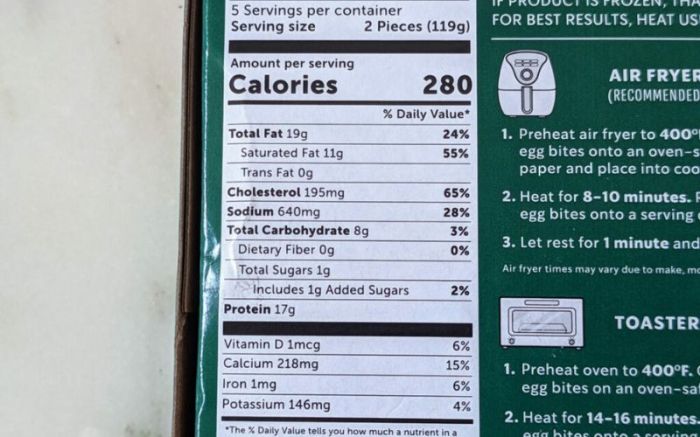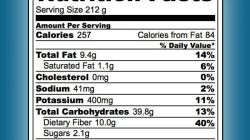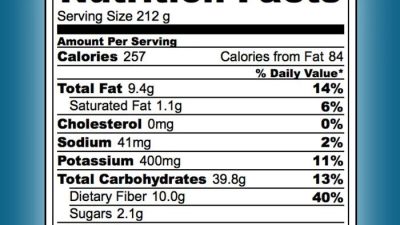Starbucks Egg Bites
Starbucks egg bites nutrition – Starbucks Egg Bites offer a convenient and protein-rich breakfast or snack option. These bite-sized meals are prepared using cage-free eggs and a variety of fillings, providing a range of nutritional profiles depending on the chosen flavor. Understanding the nutritional content is crucial for individuals managing their dietary intake.
Overview of Nutritional Information for Starbucks Egg Bites
Starbucks Egg Bites generally provide a significant amount of protein, making them a suitable choice for those seeking to increase their protein consumption. However, the calorie, fat, and carbohydrate content varies considerably depending on the specific ingredients included in each flavor. Generally, egg bites are higher in protein and fat and lower in carbohydrates compared to many other breakfast options.
The nutritional information provided below is an approximation and may vary slightly depending on preparation and serving size.
Nutritional Comparison of Select Starbucks Egg Bite Flavors
The following table presents a comparison of the approximate nutritional content for three popular Starbucks Egg Bite flavors. Note that these values are based on average nutritional information and may vary slightly. It is always recommended to refer to the most current nutritional information available directly from Starbucks.
| Flavor | Calories | Protein (grams) | Fat (grams) |
|---|---|---|---|
| Bacon & Gruyere | 180-200 | 13-15 | 12-14 |
| Spinach, Feta & Cage-Free Egg | 160-180 | 12-14 | 10-12 |
| Sous Vide Egg Bites with Roasted Red Pepper & Monterey Jack | 170-190 | 13-15 | 11-13 |
Macronutrient Breakdown and Health Implications: Starbucks Egg Bites Nutrition

Starbucks Egg Bites offer a convenient breakfast option, but understanding their macronutrient composition is crucial for assessing their impact on health and dietary goals. The specific macronutrient ratios vary slightly depending on the flavor, but generally, they are relatively high in protein and fat, with a lower carbohydrate content. This profile influences both satiety and energy levels throughout the morning.The high protein content contributes significantly to feelings of fullness.
Protein takes longer to digest than carbohydrates, leading to sustained satiety and potentially reducing overall caloric intake throughout the day. The fat content also contributes to satiety, as fats are energy-dense and slow down digestion. However, the relatively low carbohydrate content might lead to lower initial energy levels for individuals accustomed to carbohydrate-rich breakfasts. This effect is largely dependent on individual metabolic responses and dietary habits.
Macronutrient Ratios and Dietary Needs
The macronutrient profile of Starbucks Egg Bites makes them suitable for certain dietary approaches while less ideal for others. For individuals following a high-protein diet, the relatively high protein content aligns well with their dietary goals. The protein supports muscle growth and repair, contributing to overall health and fitness objectives. However, the fat content should be considered within the context of overall daily fat intake.
For those on a low-carbohydrate diet, the low carbohydrate count is advantageous, minimizing blood sugar spikes and supporting metabolic goals. However, the higher fat content may need to be factored into their daily macros. Conversely, individuals prioritizing low-fat diets might find the fat content relatively high.
Comparison to Other Breakfast Options, Starbucks egg bites nutrition
Compared to other breakfast options, Starbucks Egg Bites occupy a unique space in the macronutrient spectrum. A typical serving of plain yogurt is lower in fat and protein than a Starbucks Egg Bite, but higher in carbohydrates, depending on the type of yogurt. Breakfast sandwiches, on the other hand, often contain significantly more carbohydrates and fat due to the bread and cheese components.
The protein content might be comparable or slightly lower, depending on the specific ingredients. For example, a breakfast sandwich with sausage and cheese will have higher fat and lower protein than a Starbucks Egg Bite, while a breakfast sandwich with egg and turkey bacon will have a more comparable protein content, but still a higher carbohydrate content. The choice of breakfast option should be guided by individual dietary preferences and health goals.
The relative simplicity of the Egg Bites compared to a breakfast sandwich, which often includes highly processed ingredients, may also be a factor for some consumers.
Starbucks egg bites, a popular breakfast choice, offer a protein-packed start to the day, but their calorie count can vary. For those seeking a higher-carb alternative, you might consider checking out the nutritional information for long table pancakes nutrition facts , which offer a different macronutrient profile. Ultimately, the best breakfast choice depends on individual dietary needs and preferences, so comparing the nutritional values of both Starbucks egg bites and pancakes is key to making an informed decision.
Micronutrient Content and Health Benefits

Starbucks Egg Bites, while primarily a source of protein and fat, also provide a notable contribution to several essential micronutrients crucial for maintaining optimal health. These micronutrients, encompassing vitamins and minerals, play vital roles in various bodily functions, contributing to overall well-being and reducing the risk of nutrient deficiencies. The specific micronutrient profile varies depending on the specific Egg Bite variety, but common components and their associated benefits will be discussed.The micronutrients present in Starbucks Egg Bites contribute significantly to daily recommended intake, although they should not be considered a sole source of these nutrients.
A balanced diet remains essential for comprehensive nutritional intake.
Vitamin Content and its Role in Health
Starbucks Egg Bites contain various vitamins, primarily from the eggs and cheese components. These vitamins are essential for numerous metabolic processes and overall health. For example, eggs are a good source of Vitamin B12, crucial for nerve function and red blood cell formation. A single serving of an Egg Bite might provide a substantial percentage of the recommended daily allowance of B12, depending on the specific recipe and serving size.
Furthermore, the cheese component contributes vitamins such as riboflavin (B2), important for energy metabolism, and vitamin A, essential for vision and immune function. The precise quantities of these vitamins vary depending on the specific ingredients and preparation methods used in each Egg Bite flavor.
Mineral Content and its Importance for Well-being
Minerals also contribute to the nutritional profile of Starbucks Egg Bites. Cheese, in particular, provides a significant source of calcium, crucial for maintaining strong bones and teeth. Calcium intake is particularly important for growth and development in children and adolescents, and for maintaining bone density in adults to prevent osteoporosis. The eggs themselves provide a source of selenium, an antioxidant mineral that protects cells from damage caused by free radicals.
Additionally, the presence of other minerals like phosphorus and zinc, although possibly in smaller quantities, contributes to overall mineral balance and supports various enzymatic functions within the body. The exact mineral composition depends on the specific ingredients and their proportions within each Egg Bite recipe.
Micronutrient Contribution to Daily Recommended Intake
While the precise micronutrient content of Starbucks Egg Bites can fluctuate based on the specific recipe and ingredients used, it’s reasonable to estimate their contribution to daily recommended intake values. For instance, a single serving might provide 10-20% of the recommended daily intake of Vitamin B12, a significant contribution considering the importance of this vitamin for neurological health. Similarly, the calcium content from cheese might contribute 5-10% towards the daily recommended intake for adults, offering a modest contribution to bone health.
It’s crucial to remember that these are estimates and precise values require consulting the official nutritional information provided by Starbucks for each specific Egg Bite variety. These values are based on average nutritional content data and may vary slightly. For a complete and balanced nutritional intake, a varied diet that incorporates a wide range of fruits, vegetables, and other food groups is always recommended.
Comparison with Other Breakfast Foods
Starbucks Egg Bites offer a convenient and protein-rich breakfast option, but their nutritional value should be considered in comparison to other popular breakfast choices to determine their overall place within a balanced diet. This comparison will analyze calorie content, protein levels, and key nutritional differences to provide a comprehensive understanding of the relative benefits of Starbucks Egg Bites.
Several factors influence the nutritional profile of breakfast foods, including ingredients, portion size, and preparation methods. Direct comparisons allow for a clearer understanding of the nutritional trade-offs involved in choosing one breakfast option over another. This analysis will focus on readily available breakfast items frequently consumed by the general population.
Nutritional Comparison of Breakfast Foods
The following table presents a comparative analysis of Starbucks Egg Bites against other popular breakfast options. Note that values are approximate and can vary based on specific ingredients and preparation methods. Data is based on average nutritional information available from reputable sources such as manufacturers’ websites and USDA databases.
| Food Item | Calories | Protein (grams) | Key Nutritional Differences |
|---|---|---|---|
| Starbucks Egg Bites (Bacon & Gruyere, ~2 Bites) | ~200 | ~12 | Relatively high in protein and fat; moderate in carbohydrates. Contains saturated fat from cheese and bacon. Good source of choline. |
| Breakfast Sandwich (Egg, Cheese, Sausage on English Muffin) | ~350-450 | ~15-20 | Higher in calories and fat than Egg Bites, often with a higher saturated fat content. Higher protein content than Egg Bites, but also significantly higher in sodium. |
| Oatmeal (1 cup, cooked with water) | ~150 | ~5 | Lower in calories and protein than Egg Bites. Good source of fiber, which is lower in Egg Bites. May lack significant protein for some individuals. |
| Yogurt Parfait (Greek Yogurt with Berries and Granola) | ~250-350 | ~15-20 | Protein content comparable to breakfast sandwiches, often with lower fat content. Higher in sugar and carbohydrates depending on the granola and yogurt type. Provides probiotics and various micronutrients from berries. |
Questions Often Asked
Are Starbucks Egg Bites gluten-free?
Most Starbucks Egg Bite varieties are gluten-free, but always check the ingredient list for specific allergens as recipes can change.
How long can I keep a Starbucks Egg Bite?
It’s best to consume Starbucks Egg Bites immediately. If refrigerated, consume within a day or two for optimal freshness and safety.
Are Starbucks Egg Bites suitable for a keto diet?
Depending on the flavor and your specific macro targets, some Starbucks Egg Bites might fit a ketogenic diet. Check the nutritional information for carbohydrate content.
Can I microwave a Starbucks Egg Bite?
Yes, but follow the heating instructions provided on the packaging for the best results. Overheating may affect texture and taste.










